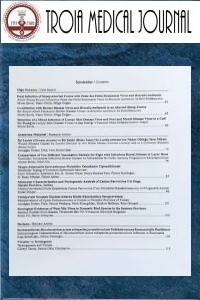Tedaviye dirençli pnömoni, parapnömonik apse mi yabancı cisim mi?
Akciğer apsesi, akciğer parankiminde nekroz ve kavite oluşumuyla karakterize ciddi bir enfeksiyondur. Akciğer apseleri çocuklarda yetişkinlere göre çok daha nadir görülmektedir. Sıklığının yılda 100.000 başvuru başına 0.7 olduğu tahmin edilmektedir. Akciğer apsesi genellikle sağ akciğerde yerleşim göstermektedir. Apselerin yaklaşık %70- 80’inde etken anaerobik mikroorganizmalardır. Akciğer apsesinde en sık başvuru şikayeti ateştir. Öksürük, nefes darlığı ve balgam çıkarma olguların büyük çoğunluğunda görülmektedir. Tanı için toraks bilgisayar tomografisi en önemli görüntüleme yöntemidir. Bu yazıda daha önceden sağlıklı olduğu bilinen, 7 gündür devam eden ateşi olan ve antibiyotik tedavisine rağmen klinik olarak düzelmeyen, çekilen postero-anterior akciğer grafisinde apse formasyonu görülen, 4 yaşında erkek hasta sunuldu. Toraks bilgisayar tomografisinde kist hidatik benzeri görünüm nedeniyle apse ayrımı yapılamayan hastaya albendazol, vankomisin, meropenem ve amikasin tedavileri başlandı. Ateş şikayetinin 10.gününde devam etmesi nedeniyle lipozomal amfoterisin B tedavisi eklendi. Yatışının 22.gününde vankomisine bağlı ilaç reaksiyonu gelişmesi nedeniyle vankomisin ve amikasin kesilerek teikoplanin başlandı. Yatışının 24.gününde lipozomal amfoterisin B’ye bağlı hipopotasemi gelişmesi nedeniyle ilaç kesilerek klindamisin tedavisine eklendi. Toplam tedavi 6 haftaya tamamlanan hasta şifa ile taburcu edildi.
Treatment-resistant pneumonia, parapneumonic abscess or foreign body?
Lung abscess is an important infection characterized by necrosis and cavity formation in the lung parenchyma. Lung abscesses are more rare in children than in adults. Its frequency is estimated at 0.7 per 100.000 applications per year. Lung abscess is generally situated in the right lung. The factor in nearly 70-80% of the abscesses is anaerobic microorganisms. The most common consultation complaint in lung abscess is high fever. Cough, shortness of breath, and expectoration are seen in the majority of cases. Thoracic computerized tomography is the most important imaging method for diagnosis. In this article, a 4-year-old male patient, who is known to be healthy before, with an ongoing high fever for seven days that did not respond to antibiotic treatment clinically and was found with abscess formation in the posteroanterior chest X-ray is presented. Albendazole, vancomycin, meropenem, and amikacin treatments were started in the patient whose abscess could not be distinguished due to a hydatid cyst-like appearance on thorax computed tomography. Liposomal amphotericin B treatment was added because the fever complaint continued on the 10th day. On the 22nd day of hospitalization, vancomycin and amikacin were discontinued and teicoplanin was started due to the development of a drug reaction caused by vancomycin. On the 24th day of his hospitalization, the drug was discontinued and clindamycin treatment was added due to the development of hypokalemia caused by liposomal amphotericin B. The patient, whose total treatment was completed for 6 weeks, was discharged with full recovery.
___
- 1. Choi MS, Chun JH, Lee KS, Rha YH, Choi SH. Clinical characteristics of lung abscess in children: 15-Year expe-rience at two University Hospitals. Korean J. Pediatr. 2015, 58, pp: 478–483.
- 2. Chidi CC, Mendelsohn HJ. Lung abscess. A study of the results of treatment based on 90 consecutive cases. J Thorac Cardiovasc Surg 1974;68(1):168-172.
- 3. Madhani K, McGrath E, Guglani L. A 10-year retrospective review of pediatric lung abscesses from a single center. Ann. Thorac. Med. 2016, 11, pp: 191–196
- 4. Feki W, Ketata W, Bahloul N, Ayadi H, Yangui I, Kammoun S. Lung abscess: Diagnosis and management. Rev. Des Mal. Respir. 2019, 36, pp: 707–719.
- 5. Lakser, OJ. Pulmonary Abscess. In: Kleigman RM, St Geme JW 3rd (eds). Nelson Textbook of Pediatrics 21st Edition. Cham: Elsevier, 2019, pp: 245-257.
- 6. Mani CS, Murray DL. Acute pneumoniae and its complications. In: Long SS, Pickering LK, Prober CG (eds). Principles and Practice of Pediatric Infectious Diseases. Cham: Elsevier, 2008, pp: 245-257.
- 7. Patradoon-Ho P, Fitzgerald DA. Lung abscess in children. Paediatr. Respir. Rev. 2007, 8, pp: 77–84.
- 8. Oliveira A, Martins L, Félix M. Lung abscesses in children—Twenty-four years of experience. Pulmonoogy 2015, 21, pp: 280–281.
- 9. Yu H. Management of pleural effusion, empyema, and lung abscess. Semin. Intervent. Radiol. 2011, 28, pp: 75–86 . 10. Kuhajda I, Zarogoulidis K, Tsirgogianni K, et al. Lung abscess-etiology, diagnostic and treatment options. Ann. Transl. Med. 2015, 3, pp: 183.
- 11. Lee JH, Hong H, Tamburrini M, Park CM. Percutaneous transthoracic catheter drainage for lung abscess: A systematic review and meta-analysis. Eur. Radiol. 2022, 32, pp: 1184–1194.
- ISSN: 2630-6107
- Yayın Aralığı: Yılda 3 Sayı
- Başlangıç: 2019
- Yayıncı: Çanakkale Onsekiz Mart Üniversitesi
